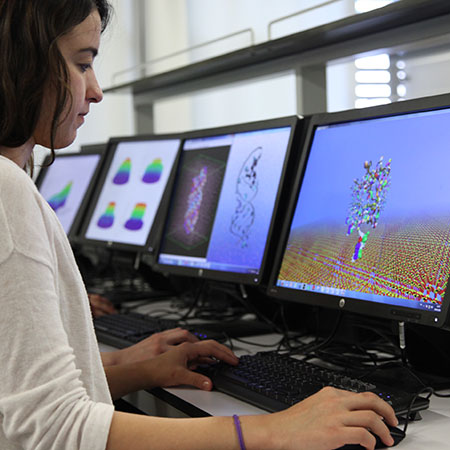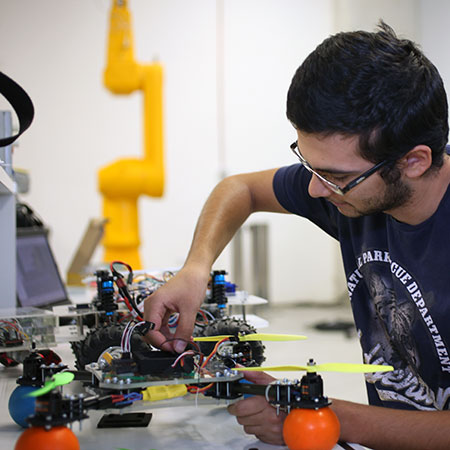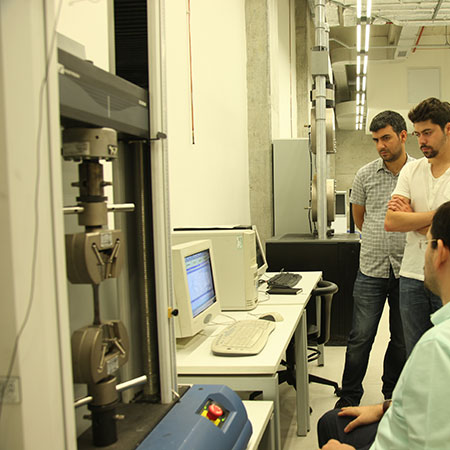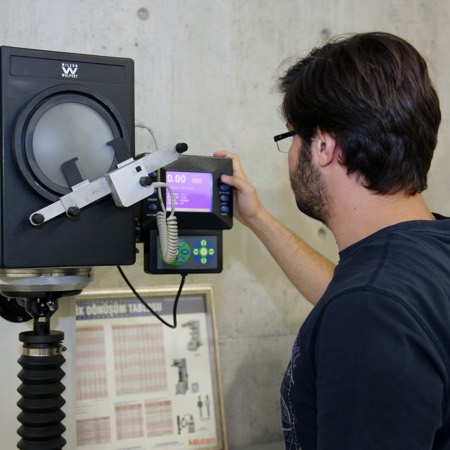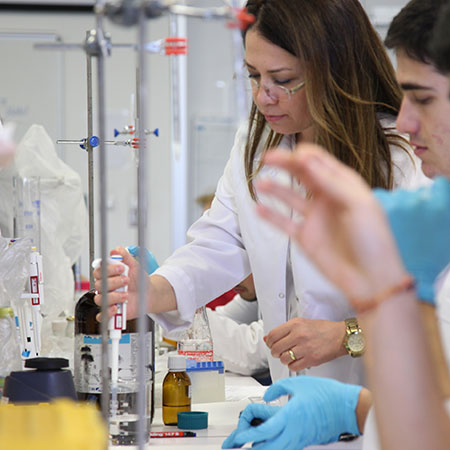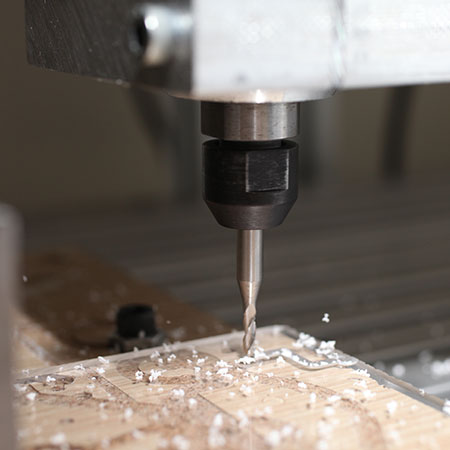Micro and nanotechnology Graduate Programs
Graduate Courses in Micro- and Nano-Technology
- FBE 600 Scientific Research Techniques and Publication Ethics (no credit - must)
|
Course Code |
Course Title |
Credits |
Credits |
ECTS |
|
MNT 501 |
Introduction to Nanotechnology |
3 Credits |
3 Credits |
ECTS: 4 |
|
Definition of nanotechnology, and its importance among current technologies; the changes materials undergo at the nano-level regarding their mechanical, optical, magnetic, and electrical characteristics; sciences serving as the foundations of nanotechnology; nano-scale production methods; nano-characterization methods; electronic, opto-electronic, composite, biomedical, catalyst, sensor technology applications of nanostructures. |
||||
|
MNT 506 |
Selected topics in nanotechnology |
3 Credits |
3 Credits |
ECTS: 4 |
|
Solar cells, hydrogen storage, quantum instruments, carbon nano-tubes and their applications, nano-mechanics, nano-composites, nano in accelerator technologies, wearable electronics. |
||||
|
MNT 502 |
Nanomaterials and their Characteristics |
3 Credits |
3 Credits |
ECTS: 4 |
|
Nanoparticles; synthesis of nanorods and thin films; their optical, mechanical, electrical and magnetic characteristics; nanofibers; nano-pore polymers; nano-ceramics; nano-structure oxides; nano-crystalline materials; nano-materials in biomedical applications. |
||||
|
MNT 513 |
Polymer Mechanics and Deformation |
3 Credits |
3 Credits |
ECTS: 4 |
|
The physical structure and elastical characteristics of polymers, linear viscoelasticity, chain modulus, chain deformation at the molecular level, yield point behaviors, chain break mechanics |
||||
|
MNT 503 |
Production and Characterization Methods at the Nano Scale |
3 Credits |
3 Credits |
ECTS: 4 |
|
Litographic methods (CVD, PVD, e-beam, ion-beam, magnetron, evaporation); molecular-beam epitaxy method; self-ranking method and applications; solvent based production methods (microcontact print, ink print, nanoimprint, dip-pen nanolitography); structural characterization methods (XRD, SAXS, SEM, TEM, SPM, Gas adsorption); chemical characterizations (optical, electron and ionic spectrometers); physical characterizations (thermal, mechanical and optical characterizations); determination of electrical and magnetic characteristics. |
||||
|
MNT 514 |
Adhesive and Fill Science |
3 Credits |
3 Credits |
ECTS: 4 |
|
Adhesive and fill polymers; factors affecting adhesion; characterization of polymeric adhesives; viscoelasticity; stress and break analyses; liquid surface analyses; characteristics of solid surfaces |
||||
|
MNT 504 |
Nanoelectronics |
3 Credits |
3 Credits |
ECTS: 4 |
|
New “bottom-up” perspective in electronics, Moore law and its limits; charge transmission and quantum relationships at the nano-scale (electron-electron interaction; tunneling; spin-orbital match); field effect transistors (FET) smaller than 50 nm; tunneling diodes; single-atom-transistors; CMOS-nano equipments; smart sensors and sensor systems |
||||
|
MNT 515 |
Polymer Process |
3 Credits |
3 Credits |
ECTS: 4 |
|
Viscous behavior of polymeric fluids; viscoelastic behavior of polymeric fluids; non-isothermal polymer process; diffusion and mass transfer; extrusion design; film and fiber draw; casting techniques; recycling of polymers |
||||
|
MNT 505 |
Nanooptics |
3 Credits |
3 Credits |
ECTS: 4 |
|
Basic linear and non-linear optics theorems for photonic crystals and metals; quantum theory for nanooptics; the relationship of electromagnetism and near-field nanooptics; nanooptical structures; fundamentals of near-field microscopy; nano-optic devices. |
||||
|
MNT 516 |
Organic Chemistry of Polymers |
3 Credits |
3 Credits |
ECTS: 4 |
|
Naming of polymers; emulsion and suspension polymerization; elastomer synthesis; controlled free radical polymerization; ionic polymerization; block co-polymers; metal-catalysis polymerization; conjugated polymers; chemicam modification of polymers; degradation and stabilization of polymers |
||||
|
MNT 517 |
Physical Chemistry of Polymers |
3 Credits |
3 Credits |
ECTS: 4 |
|
Polymer parameters; chain sizes and statistics; polymer thermodynamics; polymer solutions; molecular weight determination; amorphous and crystal forms of polymers |
||||
|
MNT 507 |
Electromagnetic Theory |
3 Credits |
3 Credits |
ECTS: 4 |
|
Advanced topics in electrostatic and magnetostatic: Electrostatic; Laplace Equation; Boundary Value Problems; Image Load Method; Multipole Expansion; Vector Potential; Magnetism; Maxwell Equations; Electromagnetic waves; Conservation laws |
||||
|
MNT 519 |
Introduction to Biotechnology |
3 Credits |
3 Credits |
ECTS: 4 |
|
Introduction to biotechnology; DNA, RNA and protein synthesis; chemical synthesis; DNA sequencing and growth; mutations and protein engineering; vaccines; antibiotics and proteins; microbial pests; plant genetics engineering and its applications; introduction to genetics; molecular genetics of humans; bioethics; biotechnology inventions; supplementary materials |
||||
|
MNT 509 |
Classical Mechanics |
3 Credits |
3 Credits |
ECTS: 4 |
|
Mathematical foundations; introduction to analytical mechanics; generalized coordinates; Langrange equations; Hamilton principle and mobility equations; principles of conservation; dynamics of solid objects; small oscillations; damped and continuous oscillation; applications; canonical transformations |
||||
|
MNT 522 |
Enzyme Kinetics and Mechanics 3 |
3 Credits |
Credits |
ECTS: |
|
Kinetics of enzyme reactions; kinetics of cell-culture; data analysis and correlation; transport in bioreactors; design and analysis of biological reactors; examples of industrial bioprocesses and products. |
||||
|
MNT 508 |
Quantum Mechanics 3 |
3 Credits |
Credits |
ECTS: |
|
Basic postulates of quantum mechanics; wave and matrix mechanics; Schrödinger’s equation; angular momentum; perturbation theory; spin-angular momentum; cumulative angular momentum; variational method, dispersion theory, Born approach |
||||
|
MNT 510 |
Solid State Physics |
3 Credits |
3 Credits |
ECTS: 4 |
|
Crystal structure of matter; diffraction in crystals; reverse-grid; attachment in crystals; grid vibrations: Phonons; thermal characteristics of crystals; optical characteristics of solids; electron conductivity; semiconductors; free-electron Fermi Gas; magnetic characteristics of matter and superconductivity |
||||
|
MNT 521 |
Computer Modeling in Bio- and Nano-Technology |
3 Credits |
3 Credits |
ECTS: 4 |
|
Molecular modeling methods; molecular mechanics; electronic structure assessment methods; computer codes for electronic structure assessment; molecular dynamic simulations and their applications; computer codes for molecular dynamic simulations |
||||
|
MNT 511 |
Atom and Molecule Physics |
3 Credits |
3 Credits |
ECTS: 4 |
|
Hydrogen atom and its spectral structure; multi-electron atoms; Hartree theory; Thomas Fermi theory; electron correlation; the interaction of atoms with static electrical and magnetic fields; Rydberg atom; the structure and spectroscopy of molecules. |
||||
|
MNT 518 |
Fuel Cells |
3 Credits |
3 Credits |
ECTS: 4 |
|
Types of fuel cells; thermodynamics of fuel cells; chemistry of fuel cells; kinetics of fuel cells; proton exchange membrane (PEM) fuel cells; components of PEM fuel cells; modeling of PEM fuel cells |
||||
|
MNT 512 |
Membrane Technology and Engineering |
3 Credits |
3 Credits |
ECTS: 4 |
|
Membrane materials; reverse osmosis membranes; proton exchange membranes; hollow fiber membranes; nano-ultrafiltration membranes; phase reverse cycle membranes; liquid removal; gas removal; membrane morphology |
||||
|
MNT 523 |
Bioinformatics |
3 Credits |
3 Credits |
ECTS: 4 |
|
Introduction to main dogma and macromolecular sequence; genome sequence methods and physical matching; genome data bank; algorithms used for finding genes; statistical methods and template recognition; philogenic analysis and molecular evolution; branch structure methods; RNA structure methods; protein structure and its analysis; protein sequence comparison and Dayhoff matrices; Gribskov-Eisenberg profiles; homology models; membrane structure; structure modeling methods |
||||
|
MNT 520 |
Biophysics |
3 Credits |
3 Credits |
ECTS: 4 |
|
Introduction: Physics in the transition from quantitative biology to qualitative biology; building blocks of cells: DNA, RNA, amino acids; proteins; lipids; Transportation in the Cell: Brownian mobility, diffusion and emission; Fick law; Langevin equation; Thermodynamics of the cell: Poisson-Bolzman equation, electrical characteristics of water; hydrogen bonds; physical models for the structure and functions of biological macro molecules; enzymes and molecular machinery; machinery on the membrane |
||||
|
MNT 524 |
Accelerator Technologies and Practices |
3 Credits |
3 Credits |
ECTS: 4 |
|
Basic particles and their characteristics; foundations of special relativity; foundations of electrodynamics; basic elements of particle accelerators; beam welding; acceleration mechanism; beam optics; linear accelerators; circular accelerators; primary and secondary beams; colliders; high-energy-physics experiments; synchotron radiation and its applications; free electron laser and its applications; proton and ion accelerators’ applications; muon beams and their applications; neutron beams and their applications; other practices; basic elements of Turkish accelerator complex of Turkey (TAC); basic research TAC is intended for; applied research TAC is intended for. |
||||
|
MNT 525 |
Nano-Structure Solar Cells |
3 Credits |
3 Credits |
ECTS: 4 |
|
This course intends to shed light on the basic operational principles of nano-structure solar cells. In this context, the characteristics of semiconductor materials; p-n joints and photovoltaic device models are covered. Furthermore, the characteristics of specific types of nano-structure solar cells, namely thin film, paint sensitive, organic and carbon based solar cells, as well as their production methods and advantages will be covered. |
||||
|
MNT 597 |
Seminar |
3 Credits |
0 Credits |
ECTS: 0 |
|
MNT 598 |
Master’s Project |
3 Credits |
0 Credits |
ECTS: 0 |
|
MNT 599 |
Master's Thesis |
3 Credits |
0 Credits |
ECTS: 0 |
|
MNT 699 |
Ph.D. Thesis |
3 Credits |
0 Credits |
ECTS: 0 |
|
MNT 529 |
Nanotoxicology |
3 Credits |
3 Credits |
ECTS: 4 |
|
This course will review the potential toxic impact both natural and synthetic nanoparticles would have on living things and the environment. The students who take this course should have taken either MNT 501, 502 or 503 as a prerequisite. Regulations about nanomaterial production, ethical issues, and risk identification will be discussed in detail. Within the framework of the course, nanomaterial production techniques will be revisited briefly; The cycle from the production to the use of a given nanomaterial will be analyzed in detail; a detailed analysis of introduction to toxicology –exposure to toxic effects, toxic effect mechanisms, methods to identify toxicity, hazards and risks with nanomaterials, cytotoxicity, genotoxicity, human toxicology and environment toxicology– will be made with reference to examples from among nanomaterials. Furthermore, the issues to be taken into consideration when working with nanomaterials; regulations regarding the use of nanomaterials (in the US, Japan, and Europe), and what can be done in Turkey; ethical issues regarding nanotechnology, and the means for informing and guiding the society will be discussed. |
||||
|
MNT 530 |
Polymer Characterization |
3 Credits |
3 Credits |
ECTS: 4 |
|
The first part of the course will discuss anionic, cationic, radical etc. polymerizations. TGA, DSC, NMR, DLS etc. polymer characterization methods will be discussed in detail. |
||||
|
MNT 531 |
Advanced Macromolecule Reaction Engineering I |
3 Credits |
3 Credits |
ECTS: 4 |
|
Naming of macromolecules, staged polymerization (polyester, polyamide, polyarylene ether etc.), reaction kinetics, molecular weight and final group control, urethane chemistry, ionomers, contribution reactions, free radical reactions and network development, emulsion and suspension methods and the synthesis of high-temperature polymers, industrial macromolecule production techniques and characterization |
||||
|
MNT 532 |
Advanced Macromolecule Reaction Engineering II |
3 Credits |
3 Credits |
ECTS: 4 |
|
Synthetic elastomers (SBR, NBR, acrylics, fluoro polymers); rubber-reinforced thermoplastics; chain break polymerization; controlled free radical polymerization; ionic and coordination polymerization; block co-polymers; metal catalyzed polymerization; conjugated polymers; chemical modification of polymers, dendrimeres; industrial macromolecule production techniques and characterization. |
||||
- Click here to see graduation requirements.
TOBB ETÜ – Micro- and Nano-Technology Ph.D. Qualification Exam Application Directive
- The Ph.D. Qualification Exam consists of two written and one oral exam.
- The Ph.D. Qualification Exam is held once or twice a year, in accordance with the demand.
- The juries to prepare and evaluate the Ph.D. qualification exam will be set up by the Ph.D. qualification committee of the department.
- The written and oral exams are completed within a time frame of two weeks.
- The Ph.D. Qualification Exam is applied as follows:
1st Stage (Written): The candidate would select 2 courses from Table 1 (1st Stage Written Exam Courses), and submit her selection to the Ph.D. Qualification Committee via her advisor(s). The 1st Stage is composed of a total of 4 questions –2 from each course approved by the committee–, and both questions will be graded separately. The Ph.D qualification committee will take into account the courses selected thus, when nominating the exam jury.
2nd Stage (Written): The exam consists of the contents of three courses the candidate had taken within the framework of the program. These courses cannot be the same ones the candidate had selected for the 1st stage of the exam. These courses are then submitted by the advisor(s) of the candidate, to the Ph.D. Qualification Committee for approval. The exam is composed of a total of 6 questions –2 from each course approved by the committee–, and each course will be graded separately. The Ph.D qualification committee will take into account the courses selected thus, when nominating the exam jury.
3rd Stage (Oral): The candidates who succeed in the written exams will be entitled to take the oral exam. The oral exam will be held by the jury assigned to the 2nd stage of the written exam. The oral exam will be about the courses selected for the 2nd stage written exam.
- Ph.D. Qualification criteria:
- To pass written exams, the candidate should get at least 65/100 in each course, and 70/100 on average.
- In the oral exam, simple majority of the jury casting a pass vote would suffice.
- The candidates who fail to pass the written exam will be made to repeat the exam for the course she failed in only, in the next semester. The Ph.D. qualification committee would vote on the basis of a simple majority to decide on whether the Ph.D. candidate passed the exam or not, as per the Graduate Education/Teaching and Exams Regulation.
- The candidates can take each exam for a maximum of two times. The candidates who fail in any exam twice will be dismissed from the Ph.D. program.
Table 1: Courses for the 1st stage written exam
|
Course Code |
Course Name |
Credit Count |
|
MNT 501 |
Introduction to Nanotechnology |
(3 0) 3 |
|
MNT 502 |
Nanomaterials and their Characteristics |
(3 0) 3 |
|
MNT 503 |
Production and Characterization Methods at the Nano Scale |
(3 0) 3 |
|
MNT 508 |
Quantum Mechanics |
(3 0) 3 |
|
MNT 533 |
Physics and Chemistry of Interfaces |
(3 0) 3 |


